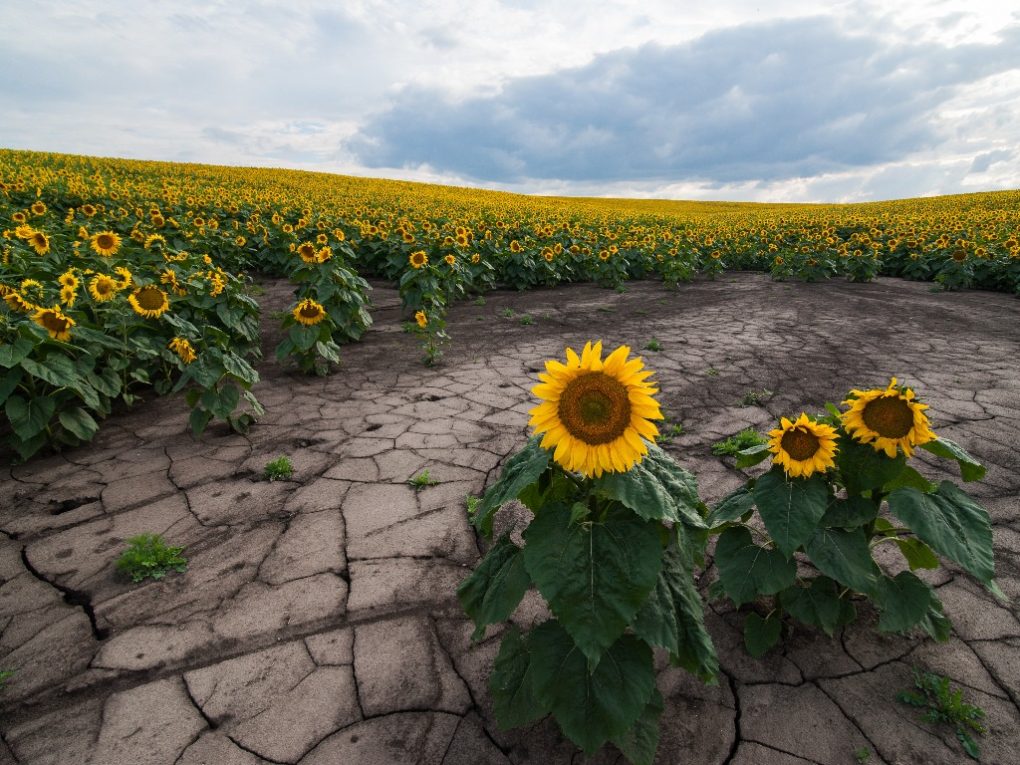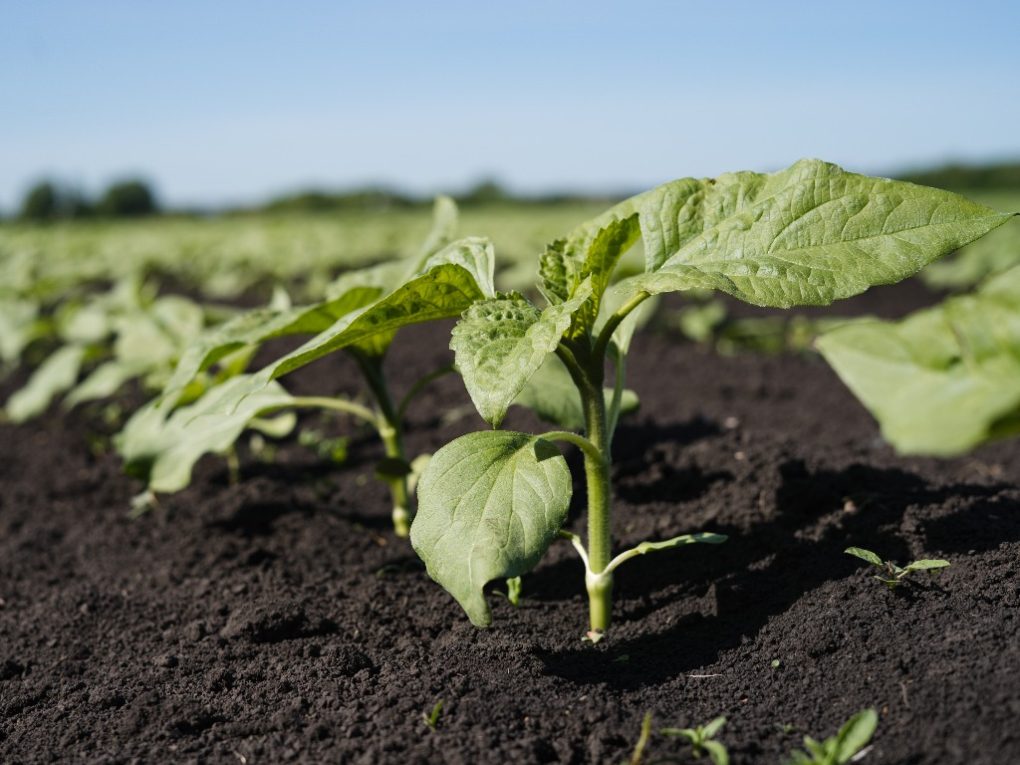Can Sunflowers Grow in Clay Soil: Tips for Growing Sunflowers in Clay Soil
Yes, sunflowers can grow in clay soil, but it’s important to note that it can present some challenges for sunflower growth. Clay soil is dense and heavy, making it difficult for roots to penetrate and absorb nutrients and water.
Clay soil also tends to retain moisture, which can lead to issues such as root rot or fungal diseases if the soil becomes waterlogged. However, sunflowers can still grow well in clay soil with the right care and preparation.

Table of Contents
Tips to Help Sunflowers Grow in Clay Soil
Amend the Soil
Clay soil is dense and heavy, making it difficult for roots to penetrate and absorb nutrients and water. Adding organic matter such as compost or aged manure to clay soil can help improve drainage by increasing pore space. This can help prevent waterlogging, leading to root rot and other issues detrimental to sunflower growth.
Clay soil can be rich in nutrients, but these nutrients can be difficult for plants to access due to the soil’s dense structure. Adding organic matter can help break down the clay particles and release the nutrients within, making them more available for sunflowers to absorb.
Sunflowers need a healthy root system to support their growth and development. By amending the soil, you can create a more hospitable environment for root growth by improving soil structure and nutrient availability.
Adding organic matter to clay soil can also help improve the soil’s overall health by providing a source of nutrients and beneficial microorganisms. Over time, this can lead to improved soil fertility and better overall growing conditions for sunflowers.
To amend clay soil for sunflowers, you can add organic matter such as compost or aged manure to the soil. Mix the organic matter into the top several inches of soil, taking care not to overwork or compact it further. By amending the soil this way, you can create a better-growing environment for sunflowers and help them thrive in clay soil.
Choose the Right Variety
Some sunflower varieties are more tolerant to heavy soil types such as clay. These varieties have developed traits such as deeper root systems, which can penetrate clay soil more easily, and thicker stems, which can support the plant better in dense soil. By choosing a variety with these traits, you can improve the chances of success in growing sunflowers in clay soil.
Clay soil can be drought-prone, especially during hot and dry periods. More drought-tolerant sunflower varieties can better withstand these conditions and continue to grow and produce flowers. These varieties often have smaller, more compact plants that can better conserve moisture than larger ones.
The soil type can be a breeding ground for soil-borne diseases that can damage sunflowers. Choosing a sunflower variety resistant to common soil-borne diseases such as verticillium wilt or fusarium can help prevent plant losses due to disease.
Sunflowers come in a range of growth habits, from short and bushy to tall and branching. Choosing a variety that is well-suited to the growing conditions in your garden, including clay soil, can help ensure the plant has the right conditions to thrive.
When choosing a variety of sunflowers to grow in clay soil, look for varieties well-suited to these conditions. Check the plant description or consult a knowledgeable plant supplier or nursery to find varieties with traits such as heavy soil tolerance, drought resistance, and disease resistance. By choosing the right variety, you can set yourself up for success in growing sunflowers in clay soil.
Plant at the Right Time
Clay soil can slowly warm up in the spring and retain moisture longer than other soil types. However, planting sunflowers too early in the season can result in slow growth and poor establishment, while planting them too late can reduce the time they have to mature and produce flowers before the end of the growing season.

Sunflowers are warm-season plants requiring warm soil to germinate and establish properly. If the soil is too cold, sunflower seeds may not germinate, or seedlings may emerge slowly and weakly. Therefore, to maximize growth and establishment, wait until the soil has warmed up before planting sunflowers in clay soil.
As mentioned, clay soil retains moisture longer than other soil types, and planting sunflowers in overly wet soil can result in poor germination, root rot, and other problems. For example, planting sunflowers after a dry spell or when the soil has had a chance to dry out slightly can help reduce these risks and promote better establishment.
Sunflowers require a relatively long growing season to reach maturity and produce flowers. Planting them too late in the season can reduce the time they have to mature, resulting in smaller plants and fewer flowers. In areas with shorter growing seasons, planting sunflowers as early as possible can help ensure they have enough time to mature and produce flowers before the end of the season.
In addition, sunflowers are sensitive to frost and other extreme weather conditions. For example, planting sunflowers when the risk of frost has passed, and weather conditions are favorable can help promote better growth and establishment.
Water Carefully
When watering sunflowers in clay soil, it is important to water deeply and infrequently rather than frequently and shallowly. This encourages deeper root growth and helps prevent waterlogging. Instead of watering daily, water deeply once or twice a week, depending on weather conditions and the soil’s moisture level.
Watering in the morning allows the sunflowers to absorb moisture throughout the day, which can help prevent moisture-related problems. Watering in the afternoon or evening can lead to water sitting on the soil’s surface and promote fungal growth.
Overwatering sunflowers in clay soil can lead to waterlogging and cause root rot and other problems. To avoid overwatering:
- Wait until the top inch of the soil is dry before watering again.
- Check drainage in the area where sunflowers are planted.
- If the area doesn’t drain well, consider planting in a raised bed or adding drainage materials to the soil.

Mulch
Mulch is a layer of organic or inorganic material spread on the soil surface around plants. Mulch helps to retain moisture in the soil by reducing evaporation from the soil surface. This is especially important in clay soils, which can become waterlogged if overwatered and dry and cracked if underwatered.
Mulch can also help to regulate the temperature of the soil. It can keep the soil cooler in hot climates, which is important for sunflowers because they prefer cooler soil temperatures. In colder climates, it can help to insulate the soil, which can help protect sunflower roots from freezing.
Also, mulch can help suppress weeds by blocking out light and preventing weed seeds from germinating. This is important because weeds can compete with sunflowers for water and nutrients, affecting their growth and yield. As the mulch breaks down, it adds nutrients to the soil, which can help improve the soil’s overall health and the sunflowers growing in it.
When using mulch in clay soil, choose a material that will not compact the soil and make it harder for water to penetrate. Some good options for mulching sunflowers in clay soil include straw, leaves, grass clippings, or wood chips.
